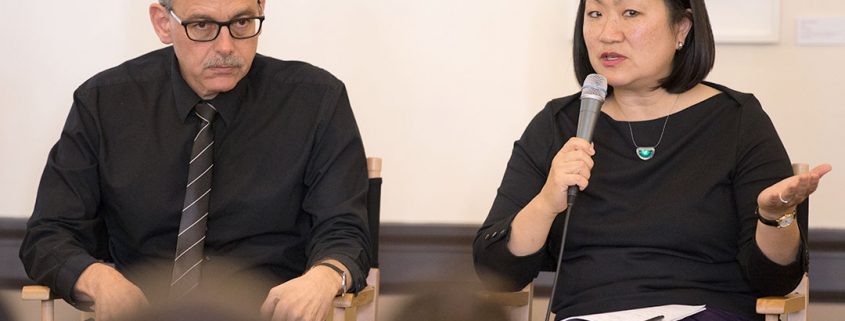Panel talks Trump’s impact on immigrants
“If people have their way, ‘we’re gonna be alright,’” moderator Manuel Pastor said, quoting rapper Kendrick Lamar, as he ended a post-election discussion on immigrant integration at the USC Caruso Catholic Center.
Natalie Reyes, a senior majoring in sociology and law, history and culture, appreciated Pastor’s humor and said that it lightened the “fear and anxiety of the undocumented community.”
Pastor moderated a panel of four members, focusing on immigrants’ emotions post-election and the effects President-elect Donald Trump will have on the undocumented community. The event hosted around 100 people.
The panel consisted of local immigrant rights advocate Anthony Ng, USC professor of political science Jane Junn, Citi Community Development Senior Vice President James Alva and Ismahan Abdullahi, director of civic engagement and community partnerships at Partnership for the Advancement of New Americans.
Ng spoke about his personal experience as an undocumented immigrant and how Trump’s election has affected him personally.
“The first three days after the elections were filled with fear. I felt that I was hated as a person of color,” Ng said. “A lot of us are still coping, but this fear is not going to make us stop fighting and stop hoping.”
The panelists described their post-election sentiments and the impact the results are having on their daily lives. Abdullahi, who is Muslim and a Somali refugee, said that the negative rhetoric by Trump has “affected our hearts and minds, and some of us are living through the fear.”
She said that in the past year, hate crimes have increased 67 percent.
“Ten years ago, I could go to a quiet place to pray. The comfortability is not there anymore,” Abdullahi said. “We need to be more inclusive so individuals can exercise their rights as Americans.”
Along with personal accounts about immigration on the panel, Alva quantified the effects a pathway for undocumented Americans to become citizens would have on the economy. He also explained how Citibank invests in immigration advocacy organizations.
“We provide funding to nonprofit organizations to help people become citizens,” Alva said. “The economy would increase between 37 to 52 billion [dollars] if people become citizens.”
Junn also explained that nearly 65 percent of voters, regardless of party affiliation, support a comprehensive immigration reform with a pathway toward citizenship.
After the panelists spoke, Pastor invited Linda Lopez, Los Angeles’ head of immigrant affairs, to speak about the city’s efforts to help undocumented locals, especially with the increase in hate crimes, which she said “brings the city great concern.”
“We are committed to our immigrant community here in L.A.,” Lopez said. “When it comes to law enforcement, Chief Beck has said they won’t comply with the federal government to deport people. This is the moment where we can build a bridge in our community.”
With regards to Los Angeles being a sanctuary city, Lopez explained that there is “different terminology” when it comes to sanctuary cities and said that the city has “really focused on policies and practices towards our immigrants” — for example, with Special Order 40 that prohibits LAPD from contacting residents specifically to ask about their immigration status.
Pastor also explained that for students, the event was important to shift focus to children and refugees who have been granted Deferred Action for Childhood Arrivals status, in response to the President-elect’s rhetoric.
Reyes said she felt an atmosphere of unity at the event and plans to equip herself with more information to be good ally to her undocumented friends and family.
“There’s still that fear for the unknown, especially with a lot of the promises Trump has made to repeal Obama’s executive orders, that have helped undocumented immigrants come out of the shadows,” she said. “It is important to build these communities and ties between different ethnic groups, so that the voices are stronger, so people can see that undocumented people contribute a lot more to society than what we know of.”

